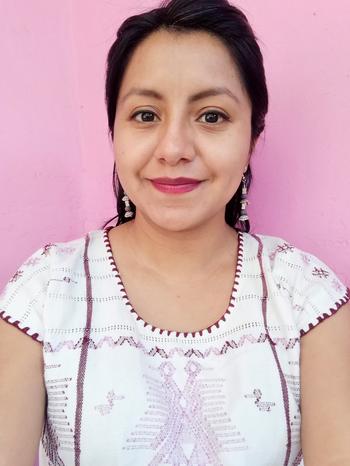Estefania Castillo Balderas

International Research Training Group 'Temporalities of Future in Latin America'
PhD Candidate
Anthropology
Project: From the Intimacy of the Home-Workshop: Assemblages of Gender Relations and Trade Networks in San Marcos Tlapazola, Oaxaca (1980–Present)
Education
|
Since 08/2023 |
PhD Candidate, Center for Research and Advanced Studies in Social Anthropology (CIESAS) |
|
08/2014 – 08/2016 |
Master in Cultural Studies, El Colegio de la Frontera Norte (El COLEF) |
|
08/2007 – 07/2011 |
Bachelor in Social Sciences and Political Studies, Universidad Autónoma “Benito Juárez” de Oaxaca |
Work experience
|
Since 05/2025 |
Researcher, International Research Trainig ‘Temporalidades del Futuro’, Berlin |
|
01/2017 – 07/2023 |
Research Assistant Instituto de Investigaciones sociológicas de la Universidad Autónoma “Benito Juárez” de Oaxaca (IISUABJO) |
|
02/2021 – 07/2021 |
Adjunct Lecturer. Universidad Autónoma “Benito Juárez” de Oaxaca (UABJO). |
|
02/2020 – 03/2020 |
Febrero 2020-marzo de 2020. Trainer in CAMINEMOS Network, a project supported by the Consortium for Dialogue and Gender Equity (Consorcio para el Diálogo y la Equidad A.C.) |
|
08/2016 – 12/2016 |
Research Assistant, El Colegio de la Frontera Norte (COLEF) |
Project: "From the Intimacy of the Home-Workshop: Assemblages of Gender Relations and Trade Networks in San Marcos Tlapazola, Oaxaca (1980–Present)"
This research project focuses its analysis on the artisanal production and transnational trade dynamics led by women potters in San Marcos Tlapazola, Oaxaca, from 1980 to the present. Life in this small town is largely sustained and upheld by women. In particular, pottery work has become central to the social reproduction of the community. As the craft has grown into the primary means of family livelihood and become increasingly embedded in global processes, it is reshaping the social landscape in ways that may be described as emergent.
The concept of intimacy is employed to analyze three interrelated scales that illuminate the interaction between local and global dynamics: 1. The transformation of domestic space into home-workshop-store environments; 2. The strategic display of intimate elements (such as marital status, restrictive gender norms, and the obstacles they hace faced as women) as marketing strategies; 3. The material relationships women maintain with clay throughout the production process.
Through an ethnographic approach, the study examines the conditions that have enabled certain women to rise within the transnational artisanal trade. It also investigates how globalized dynamics—particularly those structured around anticipation and aspiration—are reshaping local social structures. These latter dynamics are novel forces disrupting and reconfiguring the commuty’s social fabric.
Book:
Hernández-Díaz, J., & Castillo Balderas, E. (2021). Carnavales, diversidad y diferencia: Organización de la fiesta y el trabajo comunitario. Juan Pablos Editor.
Chapters:
Hernández-Díaz, J., & Castillo Balderas, E. (2020). "Las reformas de paridad y sus efectos en las elecciones municipales en Oaxaca". In M. E. Nateras González (Ed.), Espacios sociopolíticos y culturales y del comportamiento político en México (pp. 61-88). Sociedad Mexicana de Estudios Electorales A.C. / Universidad Autónoma de Querétaro, Facultad de Ciencias Políticas y Sociales.
Hernández-Díaz, J., & Castillo Balderas, E. (2018). "Migración, cooperación y gobernanza comunitaria en la microregión Zoogocho". In J. Hernández-Díaz & H. Worthen (Coords.), Historia y relaciones de la vida transnacional. Migración en la Sierra Norte de Oaxaca (pp. 103–142). Juan Pablos Editor / UABJO.


